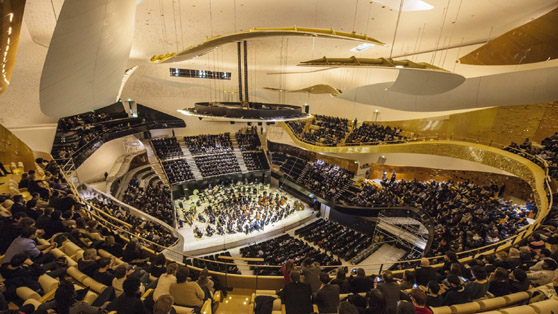
The ministry revives the concert hall project, now also with a gallery
 |
| Jean Nouvel, Philharmonie in Paris |
Prague - The project for a new concert hall in Prague has its supporters at the Ministry of Culture. Among them is the current Deputy Minister for Live Arts Miroslav Rovenský (KDU-ČSL). He connects the idea of building a large concert hall with the intention of the director of the National Gallery Jiří Fajt to construct the first modern building for this exhibition and collection institution. The project is referred to at the ministry as "a matter of the future", but it bears a name reminiscent of a similar building from the 19th century - Rudolfinum of the 21st century.
"It would be nice if we could lay the foundation stone in 2018 to celebrate a hundred years of the republic. But that is a very naive idea about how quickly this could be discussed at the political level," Rovenský told ČTK. Apart from political consensus, it is also necessary to know whether there will be funds for such a building, he added.
"We need to know where it could stand, what the capacity of the hall should be. But it is legitimate to think about it," he says, recalling that discussions about a new Paris Philharmonic have been ongoing since the 1970s. The building by architect Jean Nouvel, featuring a hall for 2400 people, opened this January. Nouvel won the competition in 2007, the same year Prague presented the design for a new National Library - in the Czech Republic, the project ended in failure, but construction began in Paris in 2009.
Rovenský, who is a musician himself, notes that the Philharmonie in Paris was supposed to cost 200 million euros, but ultimately amounted to 380 million euros. "The building in Prague will not cost less," he said. In the case of Kaplický's project, a figure of two billion crowns was mentioned; even then, politicians cited this as a reason not to build - despite allocated funds being available from the still-operating National Cultural Heritage Care Program. Kaplický's blob project ended after political opposition.
Although there was later consideration to build the blob in another location, this seems unlikely after the death of its author. The name of developer Luděk Sekyra, who is a KDU-ČSL sponsor, has been mentioned in this context, and the media associate him with the Minister of Culture. However, the minister rejects plans for joint construction with Sekyra.
The design of the new concert hall must arise from an international architectural competition. "There is consideration for a hall for 1600 people. It should have excellent acoustics, which is currently only produced by a few firms in the world - it must be clear in advance that there will also be funds for this," Rovenský said. He remarked that Prague also lacks a modern exhibition space and that the National Gallery exclusively uses historic buildings with a different original purpose.
"The question arises whether instead of two buildings, we should not build "Rudolfinum of the 21st century," a single building with a kunsthaus on the upper floors and a concert hall in the basement," Rovenský pointed out. Such a building would supposedly build on the tradition of the Rudolfinum and could be cheaper than two separate structures.
According to him, Prague should participate in the construction, and also allocate space for it in its wider center. The financial question concerns not only the construction of the building but also its operation - the Paris Philharmonic operates with an annual budget of 30 million euros, with many millions also contributed by the city and state-funded organizations. Rovenský also mentions the possibility of involving the private sector, which is a common practice abroad.
A purely concert hall has not been built in Prague since the opening of the Municipal House in 1912. In the 1960s, an architectural competition was held; the building was to be located in the Republic Square instead of the barracks. In the 1990s, Japanese investors wanted to donate a new concert hall to the Czech Philharmonic, but politicians also rejected that project back then. In recent years, an initiative has emerged from people in the music industry; ten years ago, the Association for the Construction of a New Concert Hall in Prague was formed, chaired by the director of the Prague Spring festival, Roman Bělor. In 2010, a coordinating committee was established at the magistrate, which identified locations and, according to available information, is still active and declares support for the new construction.
The English translation is powered by AI tool. Switch to Czech to view the original text source.
17 comments
add comment
Subject
Author
Date
...
ondrejcisler
27.03.15 10:33
...na Štvanici...
Zdeněk Skála
27.03.15 02:20
Je to smutné ohlédnutí
Tomáš Vích
27.03.15 09:30
...dluh...
Zdeněk Skála
30.03.15 11:12
kulturně-saturované
takyarchitekt
30.03.15 09:04
show all comments
Related articles
0
28.01.2021 | Prague wants to build a second exit from the metro station C Vltavská
0
07.01.2021 | The competition for the design of the Philharmonic could be announced by Prague in the middle of the year
17
03.12.2019 | A tender has been announced for the analysis of the usability of the concert hall in Prague
0
25.04.2018 | The competition for the design of the concert hall in Prague could take place in 2019
3
29.05.2017 | The new concert hall in Prague is to be built on Vltavská
0
31.01.2017 | Praha will identify locations for the construction of a concert hall
4
19.06.2015 | Prague is considering the construction of an exhibition hall at Letná near the metronome
0
03.12.2012 | Prague wants to have the zoning decision for the concert hall by 2014
56
20.11.2012 | Praha lacks a new concert hall, a location is currently being sought
0
29.05.2011 | Praha se nového koncertního sálu zřejmě hned tak nedočká




